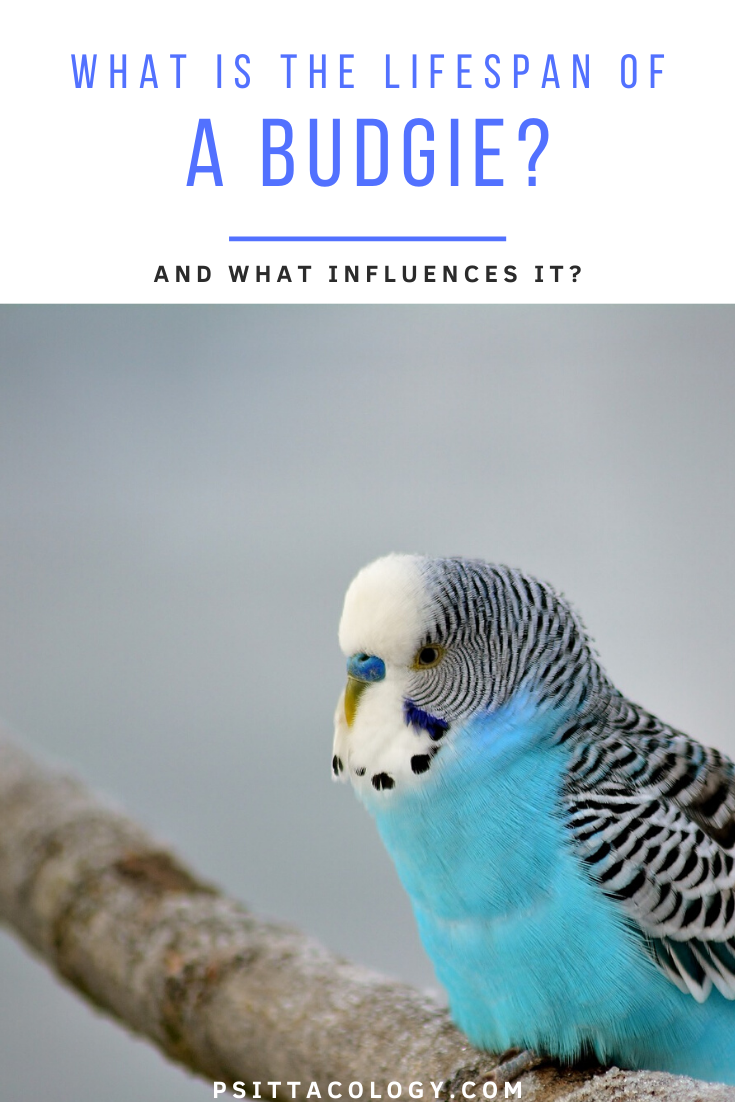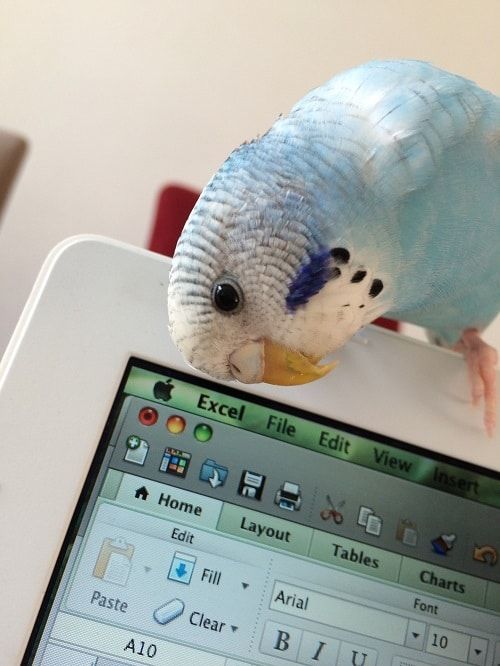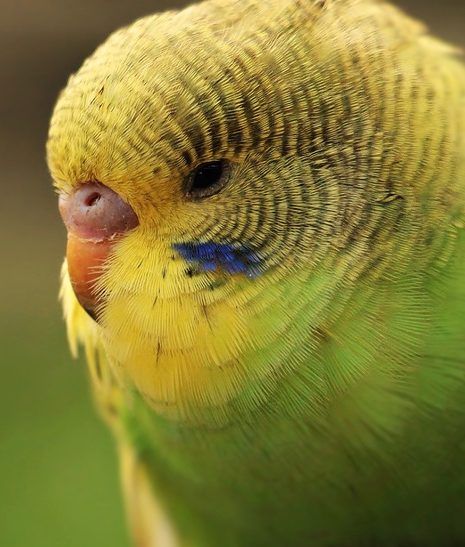If you recently got a budgie (Melopsittacus undulatus) or have had yours for a while and would like to know how much more time you’ll be able to spend with it, you might be asking yourself: how long does a budgie live? Good news here. These delightful little parakeets might be tiny, but that doesn’t mean they’re short-lived.
Keep reading for everything you need to know about the life span of a budgie and keeping yours happy and healthy!
This post contains affiliate links. If you make a purchase, a small percentage will go directly to Psittacology at no additional cost to you. Thank you for supporting Psittacology!
How long does a budgie live in the wild?
Wild budgies are found in the grasslands of Australia. This really is quite a harsh habitat, with prolonged droughts and plenty of predators. To stay safe and be able to find food and water, budgies form flocks whenever they can find other members of their species. They move around nomadically.
As you can imagine, a wild budgie won’t live as long as a domestic one will. A five-year-old one is already quite lucky and much more than eight years would be an exception. That’s why they start breeding when they’re a year old and will produce offspring whenever the rainy season rolls around.
How long does a budgie live in captivity?
Now, obviously a captive budgie won’t have to face many of the dangers that a wild budgie will. No predators and droughts! Because it’s dependent on its owner’s care, though, it might not make it much longer than its wild counterparts.
Bad bird husbandry is a rampant issue, after all. Budgies are seen as more disposable pets than cats or dogs, with many of them stuffed in minuscule cages and fed low-quality foods.
Why am I telling you this? Because it’s quite hard to pinpoint the lifespan of a budgie in captivity. A specimen that is kept in a tiny cage, with no way to exercise, in a smoker’s home and fed a bad diet might not even make it to five years. Maybe up to eight if it’s very lucky.
Although you can always get unlucky with your bird falling prey to accident or disease, the situation changes if you optimize your care. A well-cared-for budgie can actually live for over ten years. In fact, they can make it all the way up to 15 or even 20 in lucky cases.
Did you know? I dove into the Guiness Book of World Records files. The oldest budgie they have on record lived was named Charlie and lived in the UK from 1948 to 1977. That made the little guy 29 years old when he passed! There is talk of older birds, too, and some might have lived longer but weren’t recorded.
Oldest budgerigar in captivity

Lifespan of a budgie: what influences it?
So, as described above your budgie might be able to make it to 10 years of age or over. But what exactly influences the lifespan of a budgie?
A few different factors come into play.
Breeding/genetics
One very important aspect to the lifespan of a budgie that you unfortunately can’t influence is genetics. A lot of this depends on breeding.
Some breeders are focused on producing as many budgies as possible for the pet industry and making as much money as they can to keep their business going. They might not examine their stock for problems, which means genetic diseases, as well as birth defects, can run rampant.
Additionally, selective breeding comes into play. In order to produce the amazing array of budgie colorations and patterns we know today, breeders have had to select certain traits and breed them back to each other to stabilize their lines. This means breeding birds that are related to each other to make sure the offspring have the desired trait.
A certain degree of breeding back is not a problem for the resulting birds’ health, but if breeders take it too far, defects might start to pop up.
Tip: Breeding back irresponsibly is a problem in the mass production of pets and it’s no different with budgies. That’s why you might do well to find a responsible budgie breeder with heart for their birds, who won’t breed two unhealthy birds just because the resulting babies will ‘look cool’. Pet store budgies are always a gamble as you have no idea of their genetic history, although some do live to be very old.
English budgies vs wild-type
If you’ve ever seen an English budgie, you’ll know it’s quite different from the ‘regular’ wild-type variety. English budgies are much bigger and also sport a larger, fluffy head. Some budgie enthusiasts love English budgies, but if you’d like to have your feathered friend around for years to last you might want to reconsider.
The English budgie’s typical appearance was achieved through extensive selective breeding for show and the pet industry. As we’ve discussed, this can be problematic, and for English budgies it often is.
Where wild types can make it to 10 years or up, English budgies might not always be around for longer than five and are known to have more health issues.
You can read more in the full post on English budgies!

Diet
Historically, budgies in captivity have been raised on a diet of mixed seeds. In the wild, however, a budgie has adapted to eat much more varied stuff: dried seeds, yes, but also freshly sprouted ones and all sorts of leafy bits. Fruit and veg are always a plus if they can find them.
A diet of only dry seed can cause obesity in your budgie, which can be especially deadly in combination with a small cage that doesn’t allow much exercise. Your bird might love seeds, but it needs more and you should try your best to get it to eat a varied diet.
All budgies have different preferences, but a proper diet should ideally include the following:
- A high-quality fine pellet food as a staple
- Fresh vegetables (read more in the article on vegetables for parakeets)
- Freshly sprouted seeds of all kinds
- Fresh fruits (in moderation, read more in the article on fruits for parakeets)
- Mineral block and cuttlebone
- Additional options (cooked pasta or rice, a bit of boiled egg, etc.)
Classic seeds like millet can be included but should not make up the majority. Although it can be a challenge to get your budgie to accept a pelleted food, it’s important to keep trying!
Lastly, don’t forget to provide multiple fresh water sources daily!
Tip: You can find everything you need to know about the topic of budgie diet in the article on what parakeets can eat.
Care
Aside from genetics and diet, there are quite a few more general care factors that will contribute to your budgie’s long-term health and lifespan.
These include but are not limited to:
- Cage size and exercise options
- Clean air (no smoking, perfumes, non-stick pans, candles, etc.)
- Minimal stress (no rough handling, no loneliness, etc.)
- Budgie-proofing the environment if the bird flies free (minimizing dangers)
- Only safe toys
How old is my budgie?
To conclude this article, you might be wondering how old your budgie is. Now, there are some basic age indicators for these little parrots, but if your bird is an adult then you really won’t be able to tell how old it is exactly unless the breeder ringed the bird or the previous owner happens to remember.
If your budgie has a striped head with no “bald” spot (ie. it still has stripes on the top of the head) then it hasn’t molted yet and should be younger than around 4 months. The same applies to most budgies with entirely black eyes and no visible iris; if the iris is light grey or brown then that means your bird is over 8 months old.
Now, these age pointers are obviously not foolproof and don’t even apply to all budgie color varieties (some don’t have head stripes, for example). So figuring out your budgie’s age is going to be a challenge and pretty much impossible once it’s over ~8 months in age, but with good care, you’ll hopefully still be able to enjoy its company for years to come.

So, how long does a budgie live? It depends on you, but with some luck, a pretty long time!
If you have any more questions about the lifespan of a budgie or if you want to share your own experiences with keeping these delightful little parakeets, don’t hesitate to leave a comment below!


Mine was a rescue bird….Unknown how old he was When he came to me….but…he lived with me before I married…he of course went with me to new home…I I had him for total of 19 Years when he passed….My lovely boy.
Thanks for sharing ♥ I’m sorry he passed but I’m glad to hear you guys got to spend so much time together. That’s amazing. Hope it’ll be the same with my little budgies.
Wow 19 years, that is amazing! Sounds like he definitely lived his best life and was loved to have lived that long!